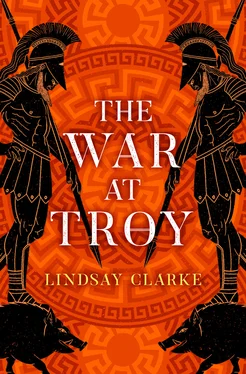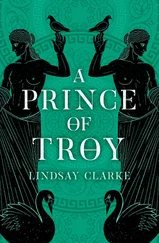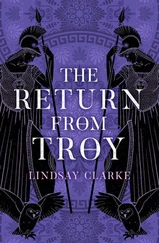‘Then bring him before us.’ Agamemnon said, ‘Let’s see if this soothsayer can bring us any better omens than did Odysseus’s dream.’
While Calchas was being summoned, Palamedes said, ‘They would have done better to leave the priest in Troy. A single friend behind the walls might have proved of more value than a whole company of archers on this side of them.’
‘The priest serves Apollo,’ Odysseus murmured from where he sat beyond Nestor to the left of Agamemnon. ‘He knows the run of his own life-thread better than you or I. In any case, it seems we may have such a friend already. And he is powerfully placed – though he may take a little time to declare himself.’
‘We do?’ said Agamemnon.
‘Odysseus refers to Antenor,’ said Menelaus. ‘He was the father of the child killed by Paris and has no love for him.’
‘Do you suspect some connection with this priest?’
‘Who knows?’ Odysseus shrugged. ‘We must see what emerges.’
At that moment Calchas was escorted down the hall. When he arrived before the Lion throne, he threw himself on the floor and lay there abased in the Asiatic manner with his arms outstretched and his forehead pressed against the tiles.
Agamemnon said, ‘I don’t much care for grovelling.’ Calchas got to his feet, arranging his dark robes, and stood before the High King with his head lowered. ‘Also I should warn you that I mislike traitors,’ the High King added, ‘– unless, of course, they can deliver my enemies into my hands.’
Calchas raised his face. Above the swarthy hollows of his cheeks, dark intelligent eyes looked back at the High King with no sign of fear or deference. Nor was there any arrogance in the voice that asserted quietly, ‘We who serve Far-sighted Apollo in his temple at Thymbra answer neither to the High King at Troy nor the High King in Mycenae. We answer only to the god.’
‘So I can rely on you no more than Priam can?’
‘If you will hear what Divine Apollo, Slayer of Darkness, has to say, you can rely on my truth. If not,’ Calchas opened his hands as if to let something fall, ‘so.’
Agamemnon sat back on the Lion throne, studying the impassive face of the priest with his chin supported on one hand. ‘Well, you’re a bold enough fellow, stealing between the lines where more cautious men might fear to tread. My envoys tell me you’ve been taking omens. I’m curious to know what the God of the Silver Bow had to say to you.’
‘That Troy will fall.’
At this confident announcement, Agamemnon turned to smile at his counsellors. Then he looked sternly back at the priest. ‘This we know already, just as we know that Mycenae will one day fall, and Sparta will fall, and perhaps even one day all Argos and the high crags of Mount Olympus itself. The pressing question is when? And how?’
‘There is a single answer,’ Calchas answered.
‘Then share it with us, friend.’
One by one, Calchas surveyed the princes around him, as if searching for some particular face among their number. Then he looked at the king again and said, ‘I do not see the sons of Aeacus here.’
‘Didn’t the god tell you that old Telamon has fought his last battle, priest? He lies bedridden in Salamis, but his sons Ajax and Teucer will shortly join us, and the ships of Salamis will follow.’
Calchas nodded. ‘And what of Telamon’s brother?’
Nestor answered him. ‘Peleus has not left his hall in Thessaly for many years. He is an old man who broods on the deaths that have shadowed his life. I think that the King of the Myrmidons longs only for his own death now.’
‘We did not expect Peleus at this council,’ Agamemnon said. ‘Why do you ask about him?’
‘Because there is a line of fate drawn between Aeacus and Troy, and it reaches across the generations. It was Aeacus who built the walls of Laomedon’s city under the aegis of Apollo and with the guidance of Poseidon. It was to his son Telamon that Troy fell at the place where the walls were weakest.’
Agamemnon sighed impatiently. ‘Telamon himself has told us this story many times. Why should we concern ourselves with it now?’
‘Because the fate of Troy is bound up with that of two sons. The first of them is Priam’s own son, Paris, who should have been killed at birth. Priam was warned by the priests of Thymbra that if the child was permitted to live he would bring destruction on the city.’
‘And this is the omen that gives Troy into our hands?’ Menelaus asked.
Calchas turned to frown at him. ‘As you know from your own experience in Sparta, a wise king does not fail to heed Apollo’s oracle – no matter what the cost.’
‘You mentioned two sons,’ said Palamedes.
Calchas nodded. ‘The omens I have taken say that Troy will fall only after the seventh son of Peleus returns from the place to which he has withdrawn and joins the fray.’
Agamemnon turned an enquiring brow to Nestor. ‘Do you know the son of whom he speaks?’
With a puzzled frown, Nestor said, ‘To the best of my knowledge Peleus has only one son.’
‘But there were six who died before him,’ Odysseus put in. ‘Achilles is the seventh son of Peleus.’
‘Good,’ said Agamemnon. ‘Then Peleus must send us this son.’
But Odysseus was frowning now. ‘I know the boy. The last time I visited Peleus a few years ago, Achilles had just returned from Cheiron’s school. He was going on to be trained by Phoenix, the King of those Dolopians who chose to remain in Thessaly.’
‘Then we will send to Thessaly for him.’
Odysseus shook his head. ‘I doubt that you’ll find him there. Peleus and Thetis have been fighting over him for years but he’s of an age to make up his own mind now. I think you’ll find that Achilles is with his mother and her people.’
‘And where are they?’ Agamemnon demanded.
‘At the court of King Lycomedes on Skyros.’
‘What difference?’ Agamemnon brought his hands together in satisfaction. ‘If that’s the place to which he’s withdrawn, then let’s winkle the lad out and get on with winning this war.’
Odysseus knew the whereabouts of Achilles because he had been party to the decision to allow him to go to Skyros. It had happened this way.
When Achilles was almost eleven years old and still a pupil in the wilderness school on Mount Pelion, King Cheiron of the Centaurs passed away peacefully in his sleep. He was found on his litter of grass by Euhippe who had returned to live with the old man after Thetis had departed for Skyros. The little Centaur woman let out a deep-drawn, moaning wail that echoed throughout the dawn light of the gorge and was quickly taken up by her tribe.
Achilles was left utterly distraught by the death, but though he did not know it yet, he was about to lose far more than a much-loved teacher. The wider world was changing in ways that left little room for Cheiron’s simple way of life, and when Peleus learned that the morale of the Centaur people had collapsed with the death of their king, he decided to bring Achilles back to his palace in Iolcus. At the same time, Patroclus was recalled by his father, Menoetius. These two boys, who had given each other a bloody nose at their first meeting, had become inseparable friends during their years on the mountain. Now they were being parted for the first time and neither dealt well with the separation.
In Iolcus things went badly from the start. The fair young face of Achilles reminded Peleus too fiercely of the wife who had burned his other children, while Achilles was shy with his father at first, and then increasingly dismayed to discover that the great king of whom he had often boasted to his friends was a morose and taciturn old man with a gammy leg. The boy wandered the halls of the palace uncomfortable in the princely robes that had been woven for him, missing the sounds and smells of the mountain woodlands and, above all, missing his friend. He grew fractious and bored. When he sensed that his father was reluctant to talk about the mother he had never known, Achilles pressed the issue. Eventually he learned what had been withheld from him earlier in order to avoid any suspicion of favouritism at the school – that Cheiron had not only been his teacher, he was also his maternal grandfather.
Читать дальше












